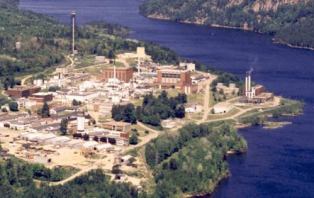Operator Atomic Energy of Canada Ltd (AECL) has announced an extension of an outage at a Canadian research reactor used to produce radioisotopes for nuclear medicine. Meanwhile, national regulators have discovered licence violations at the reactor.
 AECL announced earlier this week that a planned maintenance outage at its National Research Universal reactor at Chalk River would be extended to complete the installation of safety-related equipment. The reactor was shut down on 18 November for a planned 5-day maintenance outage. Now the reactor is expected to re-start in January.
AECL announced earlier this week that a planned maintenance outage at its National Research Universal reactor at Chalk River would be extended to complete the installation of safety-related equipment. The reactor was shut down on 18 November for a planned 5-day maintenance outage. Now the reactor is expected to re-start in January.
Meanwhile, the Canadian Nuclear Safety Commission (CNSC), the country's nuclear regulator, has announced that its staff have now discovered that the reactor was not in compliance with conditions issued when its licence was renewed in August 2006. According to press reports, AECL decided to extend the outage to complete the work after CNSC inspectors carrying out a routine inspection raised questions as to whether upgrades that should have been done around the time of the relicensing had been completed. CNSC president Linda Keen noted that had AECL not elected to extend the shutdown, the Commission would have ordered it to do so.
Meanwhile, the impact of the reactor's closure on the supply of medical isotopes remains. MDS Nordion, the Canadian company that supplies many of the world's medical isotopes including over half the world's supply of molybdenum-99, said that it is working closely with its backup suppliers to mitigate the impact. The problem is compounded by the outage of Australia's new OPAL research reactor, which officially opened in April but is currently off line until January 2008 as fuel supply issues are resolved. In the Netherlands, isotope supplier NRG has confirmed that it is stepping up production of molybdenum-99 at its High Flux Reactor at Petten.
Molybdenum-99 is used in medical equipment to generate technetium-99m, the most widely used isotope in nuclear medicine. Molybdenum-99 has a half-life of only 66 hours, meaning that supplies need to be constantly replenished. Hospitals across Canada are already reporting shortages of isotopes used in tests for a variety of health conditions.
Further information
Atomic Energy of Canada Ltd (AECL)
Australian Nuclear Science and Technology Organisation (Ansto)
Canadian Nuclear Safety Commission (CNSC)
WNA's Radioisotopes in Medicine information paper
WNA's Research Reactors information paper





_63865.jpg)
_18570.jpg)
_16159.jpg)





